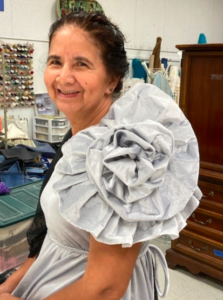By Tori Duym
Local Mercer County shelter and resource center HomeFront continues providing necessities to individuals experiencing homelessness. Fran’s Pantry offers ample opportunities to get supplies such as food and hygiene products for no cost.
The pantry is located in Lawrenceville and is open on Monday and Thursday from 11 a.m. to 2 p.m. and Tuesday from 3 p.m. to 6 p.m.
Fran’s Pantry was opened as a result of the pandemic and is named after a major contributor and volunteer at HomeFront. It has proven to be a huge success, as it is beloved by many community members. The pantry provides countless opportunities for individuals who may lack access to food or hygiene products otherwise.
According to Dylan O’Neill, HomeFront’s resource network director, the organization is on the lower end of the spectrum as far as requirements in order to receive access to the products and services. No documentation is needed; simply any type of photo ID is acceptable as a new client. Filling out a few forms to help better understand each individual’s unique needs is also requested upon first access to Fran’s Pantry. Clients are able to receive goods from the pantry starting that same day after filling out the forms.
Fran’s Pantry reaches about 150 to 200 individuals per day, according to O’Neill, based on the data gathered by staff and volunteers. “Our pantry processes a client every five to eight minutes,” O’Neill continues. Ultimately, the pantry provides food for 5,000 to 7,000 individuals monthly.
Food is not the only resource available to those who may need to utilize Fran’s Pantry. Diapers, feminine hygiene products, backpacks, bedding, kitchen supplies and even furniture are often distributed to families or individuals as well.
With the holidays approaching, HomeFront is kicking their efforts into high gear. Their annual Thanksgiving drive provides a turkey dinner to 300-400 families, as well as their Christmas drive to provide gifts for as many families as possible. HomeFront works with parents and provides two gifts up to $75 dollar value for each child in the family for Christmas.
While the language barrier has become a growing concern, Fran’s Pantry is equipped with several bilingual volunteers. According to O’Neill, only about 10% of clients speak English, making these staff members’ skills extremely useful.
The pantry has received over 2.6 million dollars in donations over the past year and was able to distribute them throughout the community to those in need. HomeFront’s mission is to “pull families out of the cycle of poverty,” O’Neill said, as Fran’s Pantry has made strides toward accomplishing this goal.
Dylan O’Neill touched upon the subject of decreasing resources as time passes and COVID-19 fades into the past. The governmental benefits are ceasing to continue, so HomeFront is working around the clock to provide all of the resources needed for individuals in the Mercer County community. Poverty has become a serious issue according to O’Neill, but they are working very hard to turn this around and support all community members.
Fran’s Pantry has grown into an extremely useful resource for the community. Contact HomeFront at homefront@homefrontnj.org or (609) 989-9417 with any questions or if you or anyone you know may benefit from their resources.



